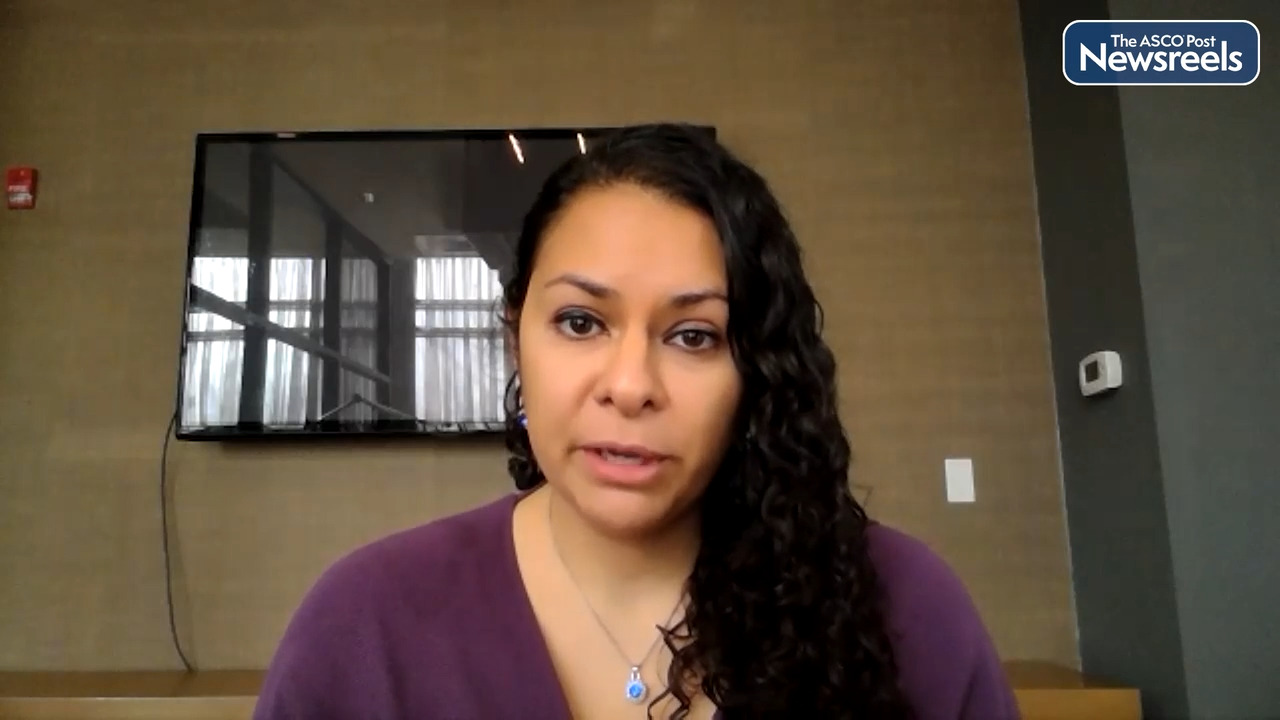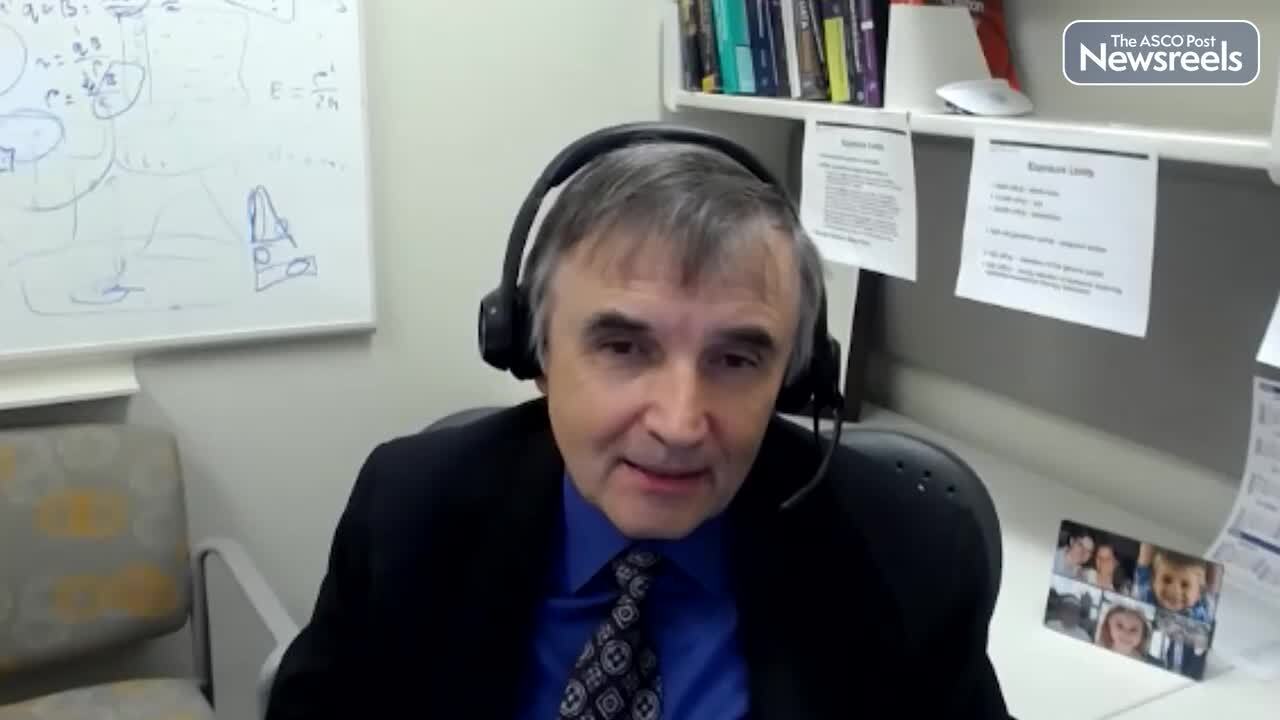Do Diagnostic Delays Impact Overall Survival in Patients With NSCLC?
In a Surveillance, Epidemiology, and End Results (SEER)-Medicare Database analysis reported in JCO Oncology Practice, Romine et al found that longer time from suspicion to histologic diagnosis of non–small cell lung cancer (NSCLC) was associated with better overall survival; however, this effect...
Abemaciclib for Previously Treated Patients With p16ink4A-Deficient Mesothelioma
As reported in The Lancet Oncology by Dean A. Fennell, FRCP, and colleagues, a phase II trial (MiST2) showed the activity of abemaciclib in previously treated patients with p16ink4A-deficient malignant mesothelioma. As stated by the investigators, “Genetically stratified therapy for malignant...
Incidental Findings on Low-Dose CT Lung Cancer Screening in the NLST and Risk of Respiratory Disease Mortality
In an analysis of data from the National Lung Screening Trial (NLST) reported in Chest, Pinsky et al found that incidental respiratory disease–related findings on low-dose computed tomography (CT) screening were common and associated with an increased risk of mortality from respiratory diseases....
Updated Efficacy and Safety Data From CheckMate 743: First-Line Nivolumab/Ipilimumab vs Chemotherapy for Unresectable Malignant Pleural Mesothelioma
With a follow-up of at least 3 years, the results from the CheckMate 743 study represent the first long-term survival data in a phase III study evaluating first-line immune checkpoint inhibition in patients with unresectable malignant pleural mesothelioma. Overall, 23% of patients treated with...
Importing Oncology Trials From China, or Other Single Foreign Countries, for Consideration of U.S. Regulatory Approvals
In a commentary published in The Lancet Oncology, Harpreet Singh, MD, and Richard Pazdur, MD, both of the Oncology Center of Excellence at the U.S. Food and Drug Administration (FDA), warned against the increasing number of oncology drug development programs based wholly or predominantly on data...
Study Finds Patients With Lung Cancer Demonstrated Psychological Resilience in the Face of the COVID-19 Pandemic
Far from being hobbled by fears of COVID-19, patients with lung cancer actually showed less depression and anxiety during the pandemic than their healthy peers, according to results from a new study by Arrato et al published in JNCCN–Journal of the National Comprehensive Cancer Network. Researchers ...
CMS Expands Coverage of Lung Cancer Screening With Low-Dose CT
On February 10, the Centers for Medicare & Medicaid Services (CMS) announced a national coverage determination that expands coverage for lung cancer screening with low-dose computed tomography (CT) to improve health outcomes for people with lung cancer. This type of screening is aimed at early...
Use of Consolidation Durvalumab and Adjuvant Osimertinib Among Key Recommendations in New ASCO Guideline on Stage III NSCLC Treatment
A new ASCO guideline provides key recommendations for the evaluation and management of stage III non–small cell lung cancer (NSCLC). Recommendations made by the ASCO expert panel cover evaluation and staging of NSCLC, neoadjuvant and adjuvant therapies, and the management of unresectable ...
Narjust Duma, MD, on Advanced NSCLC: Reducing Racial Disparities in Outcomes
Narjust Duma, MD, of Dana-Farber Cancer Institute, discusses the many factors that lead to poorer outcomes in lower-income and minority patients with advanced non–small cell lung cancer and the urgent need to address these disparities and physician bias. Women of color and other minority patients are less likely to be offered lung cancer screening; participation in clinical trials; referral to palliative and hospice care services; or genome sequencing of their tumors.
Mirek Fatyga, PhD, on NSCLC: New Data on Stereotactic Body Radiotherapy vs Conventionally Fractionated Radiotherapy
Mirek Fatyga, PhD, of Mayo Clinic Arizona, discusses his findings on overall survival in patients with locally advanced non–small cell lung cancer who are treated with stereotactic body radiotherapy or conventionally fractionated radiotherapy. He notes that a high dose of > 50 Gy to the right-superior portion of the heart likely affects its conduction system. A low dose of < 5 Gy to the inferior segments of the heart may also cause heart damage and toxicity through blood irradiation.
Sugemalimab After Concurrent or Sequential Chemoradiation for Unresectable Stage III NSCLC
In an interim analysis of the Chinese phase III GEMSTONE-301 study reported in The Lancet Oncology, Zhou et al found that the PD-L1 inhibitor sugemalimab prolonged progression-free survival vs placebo in patients with locally advanced unresectable stage III non–small cell lung cancer (NSCLC)...
PACIFIC Trial: 5-Year Survival Outcomes With Durvalumab After Chemoradiotherapy in Stage III NSCLC
As reported in the Journal of Clinical Oncology by Spigel et al, long-term follow-up of the phase III PACIFIC trial has shown maintained progression-free and overall survival benefits with consolidation durvalumab vs placebo after chemoradiotherapy in unresectable stage III non–small cell lung...
Pranshu Mohindra, MD, MBBS, on NSCLC: Benefits of Intensity-Modulated Proton Therapy–Based Reirradiation
Pranshu Mohindra, MD, MBBS, of the University of Maryland School of Medicine and the Maryland Proton Treatment Center, discusses the largest series to date reporting outcomes for patients with non–small cell lung cancer who were treated with intensity-modulated proton therapy–based reirradiation. According to Dr. Mohindra, this approach yields meaningful and durable local control, as well as prolonged survival, and is an important tool in the management of a difficult-to-treat disease.
Addition of Sugemalimab to Platinum-Based Chemotherapy for Metastatic Squamous or Nonsquamous NSCLC
In the Chinese phase III GEMSTONE-302 trial reported in The Lancet Oncology, Caicun Zhou, MD, and colleagues found that the addition of the PD-L1 inhibitor sugemalimab to platinum-based chemotherapy improved progression-free survival in the first-line treatment of metastatic squamous or nonsquamous ...
TERAVOLT Study Identifies Seven Factors That Increase Mortality Risk for Patients With Lung Cancer Infected With COVID-19
The risk of death for patients with SARS–CoV-2 infection and thoracic cancer is based on seven major determinants, according to research published by Alessio Cortellini, MD, in the Journal of Thoracic Oncology. TERAVOLT Data The researchers analyzed data from the Thoracic Cancers International...
Trastuzumab, Pertuzumab, and Docetaxel for Advanced HER2-Mutant NSCLC
In a French phase II trial (IFCT-1703-R2D2) reported in the Journal of Clinical Oncology, Julien Mazieres, MD, PhD, and colleagues found that the combination of trastuzumab, pertuzumab, and docetaxel produced durable responses in previously treated patients with advanced HER2-mutant non–small cell...
Addition of Radiotherapy to Durvalumab Plus Tremelimumab in Patients With Metastatic NSCLC Refractory to PD-1/PD-L1 Inhibitor Therapy
In a phase II trial reported in The Lancet Oncology, Jonathan Schoenfeld, MD, and colleagues found that the addition of low-dose or hypofractionated radiotherapy to durvalumab plus tremelimumab did not improve objective response rates in patients with metastatic non–small cell lung cancer (NSCLC)...
Carolyn Presley, MD, on Dementia in Patients Treated for Thoracic Cancer
Carolyn Presley, MD, of The Ohio State University, discusses the differences between “chemo brain,” cognitive aging, and dementia in patients with thoracic cancer who are in treatment; how to test for impairment; and the interventions that can improve cognitive changes in survivors.
Julia Rotow, MD, on Patient Selection in Treating Thoracic Cancers: Looking to Driver Mutations and Biomarkers
Julia Rotow, MD, of Dana-Farber Cancer Institute, discusses an education session she conducted on mutations and biomarkers in thoracic cancers, including PD-L1, a continuous variable, with the greatest benefit to treatment being associated with very high levels of PD-L1 tissue polypeptide-specific antigen. Dr. Rotow also discusses STK11 mutations, which may be associated with reduced benefit to immune checkpoint inhibitor therapy, though further study is needed.
Cancer Has Made Me a Risk-Taker, and That’s Good
In 2017, I was caring for my brother, who was suffering from respiratory failure due to complications from cerebral palsy, and working full-time as a registered nurse. I was feeling overwhelmed and exhausted all the time. I was also losing weight at an alarming rate—more than 70 pounds in just a...
Adjuvant Atezolizumab in IMpower010: Moving the Needle in Early-Stage NSCLC
Adjuvant platinum-based chemotherapy for early-stage non–small cell lung cancer (NSCLC) is currently almost an afterthought and is taken for granted as a standard of care for patients with stage II to IIIA NSCLC after resection. The earliest meta-analysis, published in 1995,1 gave the first hint of ...
Adjuvant Atezolizumab Improves Disease-Free Survival Following Adjuvant Chemotherapy in PD-L1–Positive Resected Stage II–IIIA NSCLC
As reported in The Lancet by Enriqueta Felip, MD, of Vall d’Hebron University Hospital, Barcelona, and colleagues, the phase III IMpower010 trial has shown improved disease-free survival with adjuvant atezolizumab vs best supportive care in the predefined population of patients with resected stage ...
Promise and Need for More Progress in Treatment of Squamous Cell NSCLC
A greater understanding of the mutational landscape in non–small cell lung cancer (NSCLC) has identified key oncogenes, such as EGFR, ALK, ROS, RET, and BRAF, among others. These discoveries, coupled with the availability of specific targeted small-molecule inhibitors, have transformed the...
T-DXd for Previously Treated Patients With Metastatic HER2-Mutant NSCLC
In the phase II DESTINY-Lung01 trial reported in The New England Journal of Medicine, Bob T. Li, MD, PhD, MPH, and colleagues found that fam-trastuzumab deruxtecan-nxki (T-DXd) showed durable activity in patients with metastatic HER2-mutant non–small cell lung cancer (NSCLC) refractory to standard...
Personalized Lung Cancer Risk Assessment Using a Blood-Based Biomarker Panel
In a study reported in the Journal of Clinical Oncology, Fahrmann et al found that a four-component blood-based biomarker panel showed predictive ability for the development of lung cancer. Prediction was improved when the panel was used in conjunction with the Prostate, Lung, Colorectal and...
Durvalumab/Tremelimumab With or Without Radiotherapy in Resistant NSCLC
In a recent phase II clinical trial, the combination of the PD-L1 inhibitor durvalumab and the CTLA-4 inhibitor tremelimumab curtailed tumor growth in some patients with non–small cell lung cancer (NSCLC) that was resistant to a single immunotherapy agent. The addition of radiation therapy to the...
Trends in Population-Level Stage Shift and Mortality Among U.S. Patients With NSCLC: 2006–2016
In a retrospective cohort study reported in JAMA Network Open, Raja Flores, MD, and colleagues found that a population-level shift to earlier-stage diagnosis has been accompanied by a reduction in population-level mortality during recent years in U.S. patients with non–small cell lung cancer...
Smoking Cessation After Lung Cancer Diagnosis May Improve Overall Survival
Patients with lung cancer who quit smoking after their diagnosis experienced improvement in their overall survival compared to patients who continued smoking after diagnosis, according to results from a meta-analysis published by Caini et al in the Journal of Thoracic Oncology. Researchers led by...
Comparison of Efficiency of USPSTF vs PLCO Criteria in Determining Eligibility for Lung Cancer Screening
In an interim analysis of a prospective cohort study reported in The Lancet Oncology, Tammemägi et al found that the Prostate Lung Colorectal and Ovarian Cancer Screening Trial 2012 risk prediction model (PLCOm2012) may be more efficient than U.S. Preventive Services Task Force 2013 (USPSTF2013)...
Postoperative Radiotherapy for Patients With Completely Resected Stage IIIA NSCLC and N2 Involvement
In the European phase III Lung ART trial reported in The Lancet Oncology, Le Pechoux et al found that three-dimensional (3D) conformal postoperative radiotherapy (PORT) did not improve disease-free survival vs no PORT in patients with stage IIIA N2 non–small cell lung cancer (NSCLC) who had...
Expert Point of View: Myung-Ju Ahn, MD, PhD
Myung-Ju Ahn, MD, PhD, Professor in the Department of Hematology and Oncology at Samsung Medical Center, Sungkyunkwan University School of Medicine, South Korea, said the novel regimen of sintilimab, IBI305, and chemotherapy is a promising approach in EGFR-mutated nonsquamous non–small cell lung...
ORIENT-31: Novel Four-Drug Regimen Evaluated in EGFR-Mutated NSCLC
A four-drug combination of the anti–PD-1 antibody sintilimab, the bevacizumab biosimilar IBI305, plus pemetrexed and cisplatin chemotherapy significantly improved progression-free survival compared with chemotherapy alone in patients with advanced nonsquamous non–small cell lung cancer (NSCLC) with ...
Addition of First-Line Veliparib to Chemotherapy in Advanced Squamous Cell NSCLC: No Survival Benefit in Current Smokers, but Potential Benefit Among Biomarker-Selected Patients
In a phase III trial reported in the Journal of Clinical Oncology, Suresh S. Ramalingam, MD, of Winship Cancer Institute, Emory University School of Medicine, and colleagues found that the addition of the PARP inhibitor veliparib to platinum-based chemotherapy did not improve overall survival in...
I’m Living—and Thriving—With Stage IV Non–Small Cell Lung Cancer
A diagnosis, in 2020, of stage IV adenocarcinoma non–small cell lung cancer (NSCLC) was found accidentally. I was 55 at the time and in the best physical shape of my life. I had spent the previous year and a half on a diet and exercise regimen that had rendered me 35 pounds lighter and feeling...
Atezolizumab in Adjuvant Therapy for PD-L1–Positive NSCLC
On October 15, 2021, atezolizumab was approved for adjuvant treatment following resection and platinum-based chemotherapy in patients with stage II to IIIA non–small cell lung cancer (NSCLC) with PD-L1 expression on ≥ 1% of tumor cells, as determined by a U.S. Food and Drug Administration...
Update on the Incidence of NSCLC: Focus on Need to Implement Widescale Screening
Recent articles in JAMA Oncology focused on lung cancer and screening strategies. Apar Kishor Ganti, MD, MS, of the University of Nebraska Medical Center, Omaha, and colleagues provided updated data on non–small cell lung cancer (NSCLC) incidence, prevalence, and stage through 2017.1 Sylvia K....
Low-Dose Computed Tomography: A Window Into Early Lung Disease?
Lung health in adults has traditionally been defined as the absence of disease, but it may be time to rethink this paradigm, according to Ravi Kalhan, MD, MS, Director of the Northwestern Asthma and Chronic Obstructive Pulmonary Disease (COPD) Program at Northwestern University Feinberg School of...
Big Data and Vulnerable Populations: Addressing the Gap in Lung Cancer Screening
Recent advances in medical imaging have led to more accurate detection and management of early thoracic diseases such as lung cancer, chronic obstructive pulmonary disease (COPD), and cardiovascular disease—three of the top four leading causes of death in the United States. Unfortunately, if not...
Poziotinib in Previously Treated Patients With NSCLC and HER2 Exon 20 Insertion Mutations
In a cohort of the phase II ZENITH20-2 trial reported in the Journal of Clinical Oncology, Le et al found that the tyrosine kinase inhibitor poziotinib produced responses in previously treated patients with non–small cell lung cancer (NSCLC) and HER2 exon 20 insertion mutations. Study Details In...
Immunomodulatory Effects of Neoadjuvant Nivolumab, Chemotherapy in NSCLC
The immunomodulatory effects of neoadjuvant immune-based treatments for non–small cell lung cancer (NSCLC) are becoming clearer, in part due to data presented by Schmidt et al at the Society for Immunotherapy of Cancer (SITC) 2021 Annual Meeting (Abstract 962). The first integrated analysis of...
Stephanie T. Schmidt, PhD, on NSCLC: The Immunomodulatory Impact of Neoadjuvant Chemotherapy and Immune-Based Treatments
Stephanie T. Schmidt, PhD, of The University of Texas MD Anderson Cancer Center, discusses the first integrated examination of the immunomodulatory effects of neoadjuvant chemotherapy, nivolumab, and nivolumab plus chemotherapy in resected non–small cell lung cancer (Abstract 962).
UKLS Trial Meta-analysis Confirms Mortality Reduction With Low-Dose CT Screening for Lung Cancer
Low-dose lung cancer screening by computed tomography (CT) is associated with a 16% relative reduction in lung cancer mortality over no lung cancer screening of high-risk individuals, based on a meta-analysis conducted by investigators with the United Kingdom Lung Cancer Screening (UKLS) trial.1...
T-DXd Makes Inroads in the Treatment of HER2-Mutant NSCLC
Previously treated patients with HER2-positive non–small cell lung cancer (NSCLC) achieved encouraging response rates and duration of response to the antibody-drug conjugate fam-trastuzumab deruxtecan-nxki (T-DXd) in the phase II DESTINY-Lung01 trial. These results were reported at the European...
Can SBRT to Selected Sites of Limited Progression or Oligoprogression Extend Progression-Free Survival in Advanced Lung Cancer but Not Breast Cancer?
Stereotactic body radiation therapy (SBRT) lengthens progression-free survival for patients with advanced lung cancer who have oligoprogression (ie, tumors that have not been fully responsive to systemic chemotherapy or immunotherapy), according to an interim analysis of the CURB oligoprogression...
Durable Responses in Metastatic NSCLC: Are We Getting Closer to a Cure?
In the United States, the incidence-based mortality related to non–small cell lung cancer (NSCLC) has decreased by approximately 3% each year since 2008 in men; during the same period, the mortality in women decreased by 2% to 4% annually.1 Although multiple factors are likely responsible for the...
2021 State of Lung Cancer Report Finds Survival Has Increased but Remains Significantly Lower for People of Color
The new 2021 State of Lung Cancer report reveals that the 5-year survival rate for lung cancer increased from 14.5% nationally to 23.7%, yet it remains significantly lower among communities of color. The American Lung Association’s fourth annual report also highlights how the toll of lung cancer...
French Study Finds COVID-19 Vaccine Effective in Patients With Lung Cancer
In a new study published by Gounant et al in the Journal of Thoracic Oncology, researchers from France showed that SARS–CoV-2 vaccines are safe and effective in patients with thoracic cancer, most of whom are immunized after two doses. A third shot given to 11% of patients with persistent low...
The Worst Part of Having Cancer Was the Guilt
When I was diagnosed with small cell lung cancer in 1992, at age 38, I remember thinking, “I wish I had breast cancer.” Breast cancer elicits such sympathy from people. A diagnosis of small cell lung cancer mainly gets you stern looks of disapproval and disappointment. There is so much stigma...
IMpower010: Adjuvant Atezolizumab Improves Disease-Free Survival and NSCLC Relapse in Patients Whose Tumors Express PD-L1
Adjuvant immunotherapy with atezolizumab after standard chemotherapy improved disease-free survival and time to locoregional and distant relapse compared with best supportive care in prespecified subgroups of patients with stage II to IIIA non–small cell lung cancer (NSCLC), according to an...
Adjuvant Gefitinib vs Cisplatin/Vinorelbine for Completely Resected EGFR-Mutant Stage II to IIIA NSCLC
In the Japanese phase III IMPACT trial reported in the Journal of Clinical Oncology, Tada et al found that adjuvant gefitinib did not improve disease-free survival vs cisplatin/vinorelbine in patients with completely resected stage II to IIIA EGFR-mutant non–small cell lung cancer (NSCLC). In the...






